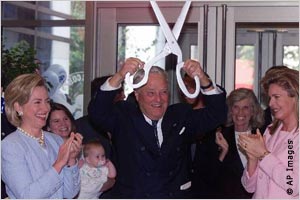
19 January 2011
Peace Corps and Special Olympics Founder Sargent Shriver Dies

Washington — R. Sargent Shriver, whom the Peace Corps describes as its “founding father” and whose public service initiatives include co-founding the Special Olympics with his wife, Eunice Kennedy Shriver, and creating programs to combat poverty, died January 18 at age 95 after suffering from Alzheimer’s disease.
In a January 18 statement, President Obama described him as “one of the brightest lights of the greatest generation,” and said, “Sarge came to embody the idea of public service” and gave many Americans the chance to “serve as ambassadors of goodwill abroad” through their participation in the Peace Corps.
“His loss will be felt in all of the communities around the world that have been touched by Peace Corps volunteers over the past half century and all of the lives that have been made better by his efforts to address inequality and injustice here at home,” Obama said.
Vice President Biden said Shriver’s long life was “a full and magnanimous one spent enthusiastically in the service of others” and described him as a “national treasure” in a January 18 statement.
“It was Sarge who founded the Peace Corps at a time when others were skeptical of U.S. motivations abroad. It was Sarge who led the War on Poverty at a time when the poor were a forgotten ‘other America.’ It was Sarge who, with his dear wife of 56 years, Eunice, spent decades fighting for the rights and abilities of people with intellectual disabilities. He spent his life fighting intensely for those who needed it most,” Biden said.
Former California Governor Arnold Schwarzenegger, who is Shriver’s son-in-law, said January 18 that Shriver’s life was “a blueprint for those of us who aspire to place the needs of others above our own.”
Born November 9, 1915, in Westminster, Maryland, Shriver married Eunice Kennedy, sister of future President John F. Kennedy, in 1953, and helped to racially integrate Chicago’s public and parochial school systems before working on Kennedy’s 1960 presidential campaign.
During that campaign, Kennedy proposed the idea of a Peace Corps, in which Americans would offer national service by working and living in developing countries. Upon his inauguration in January 1961, Kennedy asked Shriver to lead a task force to establish the agency, telling his brother-in-law to “Be fast, and be bold.” After the Peace Corps was established on March 4, 1961, Shriver became its first director.
Between December 1961 and today, the Peace Corps has grown from 500 volunteers in Chile, Colombia, Ghana, India, Nigeria, the Philippines, St. Lucia, Tanzania and Pakistan to an alumni of at least 200,000 Americans who have lived and worked in 139 different countries with the goal of building peace and friendship through their work to improve human welfare around the world.

According to the Peace Corps (see the Peace Corps website), the creation and growth of the agency “was an extraordinary effort that only could have been accomplished by a leader with immense skill, audacious vision and indefatigable energy.”
Former Peace Corps volunteer Margaret Rubin wrote in tribute on Shriver’s website that he “was a mentor for my desire to make a difference in the global family community” and “represented a shining example for changing the world one person at a time.”
“I am 64 and still trying to live up to his legacy,” Rubin wrote.
Shiver himself once said that the Peace Corps “represents some, if not all, of the best virtues” in American society. “It stands for everything we believe in and hope to achieve in the world.”
Kennedy’s successor, President Lyndon Johnson, tasked Shriver with leading the “War on Poverty” in the United States in the mid-1960s. Shriver adapted the Peace Corps model to create the Volunteers in Service to America (VISTA) to improve life in U.S. cities, as well as the Head Start program aimed at educating low-income preschool students, the Job Corps to teach vocational skills to young people, the legal services for the poor program, and the Indian and Migrant Opportunities training program for Native Americans.
With his wife, he founded the Special Olympics organization in 1968 that today has helped more than 3 million athletes with intellectual disabilities from around the world to compete for medals and achieve a new visibility and acceptance in their societies. He served as chairman of the board of Special Olympics International during the 1980s and 1990s.
In 1972, Shriver was Democratic presidential nominee George McGovern’s vice presidential running mate, and he competed for the Democratic presidential nomination in 1976.
Journalist and peace activist Colman McCarthy wrote in 2002 that Shriver’s record of public service and innovation was “unmatched by any contemporary leader in or out of government.”
Shriver reportedly spent his life encouraging those around him to “serve, serve, serve,” and said that “When our deeds match our ideals, we will be living life as it ought to be lived.”
In awarding Shriver with the Presidential Medal of Freedom in 1994, President Bill Clinton said, “In my lifetime, America has never had a warrior for peace and against poverty, a warrior to make peace the noblest of endeavors, like Sarge Shriver.”
See Shriver’s website for more tributes.
(This is a product of the Bureau of International Information Programs, U.S. Department of State. Web site: http://www.america.gov)
